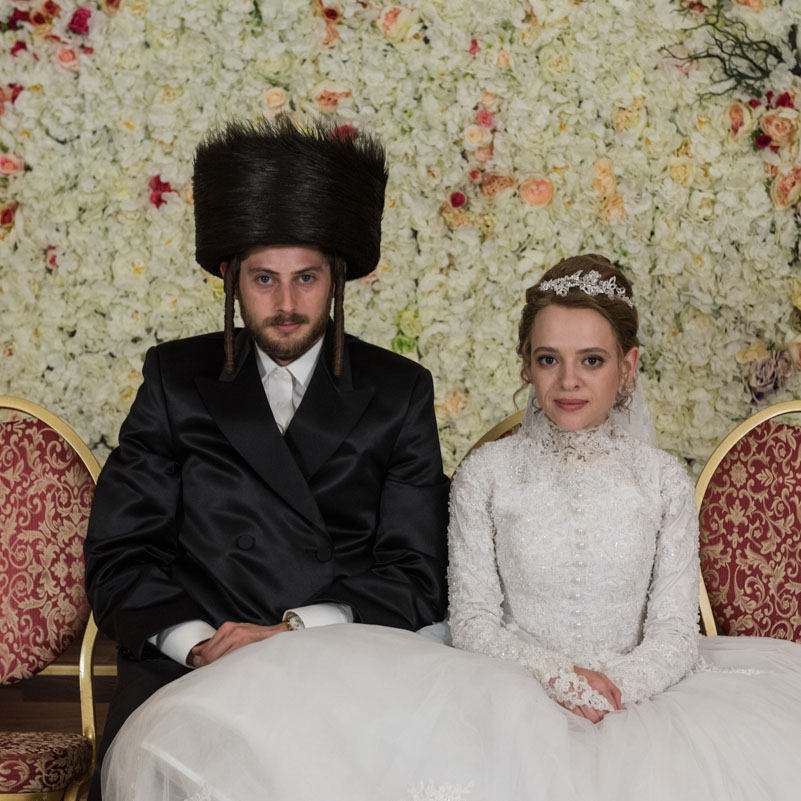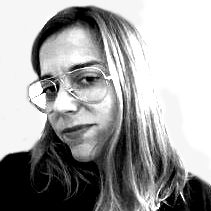“O.K., so this is the scene where Jeff’s character tries to abduct Shira’s character,” explains Eli—pronounced “Elly”—Rosen in between takes. The white earbuds that snake through his long salt-and-pepper beard are plugged into a walkie-talkie where he can hear the barking of the second assistant director. It’s July, and we’re on the Berlin set of Unorthodox, a mini-series (now streaming on Netflix) loosely based on Deborah Feldman’s autobiography about her escape from the Hasidic community in Williamsburg, Brooklyn, to pursue an independent life in Berlin.
Unorthodox’s executive producer Anna LeVine Winger hired Rosen as the show’s Yiddish-language and Hasidic-culture consultant, English-to-Yiddish translator, and co-star. (He also plays a rabbi in the series. And, once a cantor in real life, he lends his voice to the soundtrack.) “The text is actually really powerful and dramatic,” Rosen explains.
This scene, as well as about 50 percent of Unorthodox’s dialogue, is in Yiddish, a language only a couple of the actors had already spoken. As the director, Maria Schrader, calls for a break, the Israeli actress Shira Haas, hair shorn off for the part, comes over to give Rosen an affectionate headbutt. “Nu?” he asks her. She smiles. Rosen gives a thumbs-up to her line delivery. On to the next.
From Hasidim to Hollywood
Today, Yiddish, a thousand-year-old diaspora amalgam of German, classical Hebrew, and various Slavic add-ins, is the mother tongue of only about 600,000 people; on the eve of the Second World War, the number was estimated to be 11 times larger. (Eighty-five percent of the Jews killed in the Holocaust were native Yiddish speakers.) “I’d say about 99 percent of them today are Hasidic,” says Rosen. Or they are ex-Hasidic, like him.
Rosen grew up in a community in Borough Park, Brooklyn, the youngest of five children. When he was 12, he recalls, “I found a box of my parents’ books from college. My mother was an English major until she dropped out to get married, which is when my family went from Orthodox to Hasidic.” Rosen wasn’t allowed to read whatever he wanted as a kid, so he kept secret his plundering of the erstwhile family canon, which included Friedrich Nietzsche and Ayn Rand. “There’s a Talmudic passage that reads, ‘Wisdom among nations is not to be believed.’ Meaning, all the wisdom in the world is contained in the Torah. I came to realize that wasn’t true and started to wonder what else wasn’t.”

It took Rosen another two decades to formally split from the community. By then he had worked in Frankfurt, doing outreach for Chabad House, an international organization that promotes Orthodox Judaism, earned a law degree, and held an associate position in mergers and acquisitions at Boies Schiller Flexner. At age 37, “my creative soul was dying,” he says. He was then contacted by some ex-Hasidic friends, Malky Goldman and Melissa Weisz, who were starting a film-production company. “Sitting across the table from them at lunch, I said, ‘I’d rather be on the other side of the table with you.’” Rosen told them he could write and sing, so Goldman and Weisz invited him to join a workshop for budding ex-Hasidic performers at the Kraine Theater, in the East Village. David Mandelbaum, the artistic director of New York’s New Yiddish Rep, stopped by. Before the night was over, he had hired the whole company.
“He needed young Yiddish speakers, and there aren’t that many,” Rosen says. Soon he was starring in a New Yiddish Rep adaptation of Sholem Asch’s 1907 play, God of Vengeance; helping to translate texts like Rhinoceros and The Labor of Life; workshopping a one-man show, The Drunk Cantor (in Yiddish with supertitles); and branching out into movies as a dialogue coach.
A Cottage Industry
Business has been good. In addition to Unorthodox, Rosen just worked on An American Pickle, a time-traveling comedy starring Seth Rogen, and the indie film Minyan, about Russian-Jewish immigrants in Brighton Beach. These days, “people love to throw around the term ‘Yiddish cultural revival,’” he says. Rosen estimates that about five percent of the New Yiddish Rep’s audience on any given night is actually Yiddish-speaking. (Performances always feature supertitles projected above or to the side of the stage.) But klezmer, the traditional folk music of the Ashkenazi Jews of Eastern Europe, and contemporary Yiddish poetry are thriving. Indeed, literature classes are taught in Yiddish in Ivy League schools. If you’re on Stitcher, don’t miss The Shmooze, the Yiddish Book Center’s weekly podcast.
“I think some of it’s cyclical,” Rosen says. “But young American Jews are looking for an alternative to Jewish identity that’s not based on Israel and Zionism. There’s a wave of college kids, some even non-Jews, who are discovering a tradition of progressive politics in Yiddish.”
They can reach back to the International Jewish Labor Bund, the anti-Zionist, 19th-century socialist organization that promoted Yiddish literature. Or look to New York at the turn of the 20th century, when a flourishing and sophisticated Yiddish-theater scene on Second Avenue helped lay the groundwork for American drama. (The famed acting coach Stella Adler’s father, Jacob, headed up the renowned Independent Yiddish Artists’ Company, which adapted classical plays into Yiddish, much like New Yiddish Rep does today.) In its first Broadway run, in 1923, God of Vengeance, then translated into English, depicted a lesbian kiss that got the entire cast arrested for obscenity.

But the Yiddish represented in Unorthodox is not of this variety. A story of separation, it’s been personal for Rosen, who also advised the series’s writers, including Anna LeVine Winger and Alexa Karolinski, on the Hasidic mindset. “So much of this has been triggering in so many ways,” he says. “I suggested lines for my character that my grandfather said to me when I was leaving. And there’s the ever present fact that we’re filming in Germany,” the scene of the original crime that Hasidic piety is said to expiate, or at least help prevent the next one. “In the scene you just watched, Jeff’s character was originally telling Shira’s, ‘This place is haunted with millions of souls of murdered Jews.’ And then she said, ‘We are haunted.’ That’s something that had to be reworked. The concept of haunting doesn’t really exist in Judaism. There are no ghosts as such. The presence of souls is a beautiful thing. So I re-wrote that as ‘The souls of the murdered are among us.’ Because the dead are among us. It doesn’t matter where we are.”
Alexandra Marshall is a Writer at Large for Air Mail based in Paris


